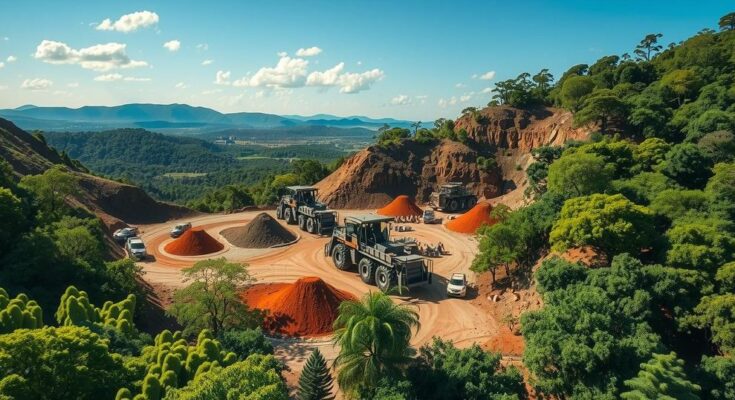A potassium mining project in Brazil’s Amazon rainforest threatens Indigenous rights and divides the Mura tribe. While some members view it as an economic opportunity, others fear environmental harm and cultural loss. The project’s approval process faces legal scrutiny, and significant divisions among the tribe complicate the issue.
In the Amazon rainforest of Brazil, tensions arise as a significant potassium mining project threatens Indigenous rights and environmental integrity. Indigenous leader Filipe Gabriel Mura expresses concerns over the potential degradation of their ancestral lands. The mining project by Brazil Potash Corp., aimed at extracting potash for fertilizers, is anticipated to begin with an investment of $2.5 billion, targeting the increase of agricultural production in Brazil.
The project location is near the Madeira River and involves extensive underground mining operations, including the construction of a processing plant and infrastructure. However, the initiative has faced legal challenges, primarily due to claims of inadequate consultations with the Mura tribe and fears of environmental contamination in a flood-prone region. Mura asserts their cultural identity is at risk due to this potential encroachment.
The Mura, with a current population of around 13,000, have historically been marginalized. Despite their requests for territorial recognition since 2003, key villages such as Soares and Urucurituba remain unrecognized, complicating the situation further. Brazil Potash claims community support for the project, yet Indigenous rights defenders criticize the consultation procedures as inadequate and misleading.
While some Mura leaders see the mining project as a pathway to economic improvement and cultural preservation, others express deep concerns about the sacrifices involved. Members of the Mura tribe are experiencing division, complicating collective decision-making. Internal conflicts have surfaced, with a significant faction breaking away from the long-established Indigenous council to form a new organization opposing the project.
The project also poses environmental risks, including pollution from mining byproducts and potential impacts on local ecosystems. The Brazilian government supports the mining initiative, citing its importance for energy independence and economic growth amidst global supply shortages. Significant partnerships with major agricultural firms are already in place, further entrenching the project’s viability but also perpetuating internal discord within the Indigenous community.
The potassium mining project in Brazil’s Amazon has created significant tensions between development and Indigenous rights. The Mura tribe is divided on the project’s implications for their cultural identity and environment. While proponents view it as an economic opportunity, opponents fear loss of land and cultural erosion. With environmental risks and legal challenges, the future of both the project and the community remains precarious, reflecting broader issues faced by Indigenous peoples globally.
Original Source: apnews.com




